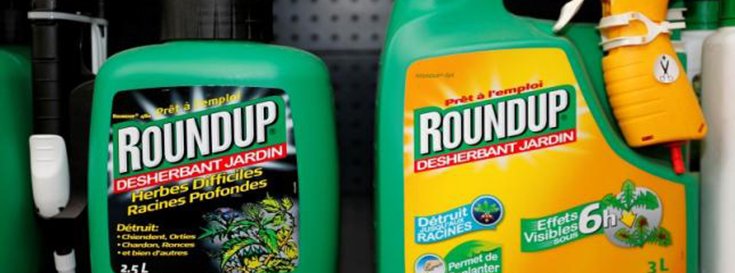Huge: Monsanto Sues California to Keep Round Up Off Carcinogen List

Months after the World Health Organization’s cancer research arm declared the herbicide chemical glyphosate ‘probably carcinogenic,’ the state of California announced a move to place a cancer label on products containing the ingredient. That would include biotech giant Monsanto’s best-selling herbicide, Round Up. Outraged about the news, Monsanto is now suing California to keep Round Up off the state’s list of carcinogens.
Monsanto recently reported that it filed the suit against the state’s Office of Environmental Health Hazard Assessment (OEHHA) and the agency’s acting director, Lauren Zeise, in California state court. This was the company’s response to OEHHA, who last September, issued plans to add glyphosate to the state’s list of chemicals known to cause cancer, making it the first state in the country to do so.
Monsanto has disputed OEHHA’s and the WHO’s International Agency for Research on Cancer’s (IARC) assessment, citing decades of studies finding “glyphosate to be safe”, including a 2007 study by OEHHA which concluded the chemical was unlikely to cause cancer.
We’ve learned a lot more about glyphosate since 2007, though. The Center for Food Safety has outlined instances of pancreatic, kidney, and other cancerous tumors linked to glyphosate exposure.
Still, Monsanto continues to say that its chemical concoction isn’t toxic. Many have seen the writings on the wall – that glyphosate and Round Up toxicity have been grossly underestimated.
Phil Miller, Monsanto’s vice president of regulatory affairs, says:
“The IARC classification of glyphosate is inconsistent with the findings of regulatory bodies in the United States and around the world, and it is not a sound basis for any regulatory action.”
Monsanto’s lawsuit argues that listing glyphosate under Proposition 65, as the state’s law is known, based on the IARC’s classification cedes regulatory authority to an “unelected, undemocratic, unaccountable, and foreign body” that is not subject to oversight by any state or federal entity.
If passed, the California law would also set a precedent for other products Monsanto might offer in the future.
California wants a “clear and reasonable warning” to consumers that the chemical is known to cause cancer, but this could damage Monsanto’s reputation and, according to the company – violates its First Amendment rights. Apparently our right to NOT be exposed to toxic chemicals are secondary.
The case is Monsanto Company v. Office of Environmental Health Hazard Assessment, et al, case number 16-CECG-00183 in the Superior Court of the State of California, County of Fresno.
Additional Sources:
Featured image credit: REUTERS/CHARLES PLATIAU

Monsanto will probably be successful. After all, Prop 65 doesn’t even cover fluoride, which is more toxic than lead.
Monsanto should lose since there’s clear proof of its toxicity on human and all life.
This is true both anecdotally and scientifically.